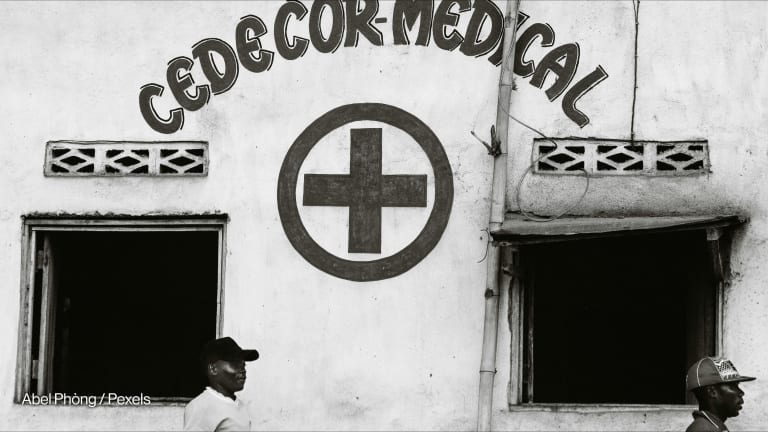
Realizing the Sustainable Development Goals will require mobilizing trillions of dollars in public and private sector investments. Yet, as Brookings Institution experts have argued, the development community’s “billions to trillions” mantra for the SDGs has failed to channel investments to “specific people and places,” especially in fragile states. Fragile states are severely off track to meet the SDGs. A staggering 80% of the world’s extreme poor are projected to be living in these contexts by 2030 — the endpoint of the SDGs.
Development Finance
Over the last few months, World Vision has partnered with Devex to convene governments, multilateral institutions, civil society, and the private sector for a dialogue on new ways of investing in fragile states to promote greater resilience and development. From a major SDGs conference in London to a highly interactive workshop — which UNICEF co-hosted with us — during the World Economic Forum’s annual meeting in Davos, Switzerland, we set our sights on rethinking approaches and solutions to unlock greater development financing in the face of fragility.
Mobilizing development finance for such places must be a top-line goal to meet the SDG’s promise to “leave no one behind.” Yet solutions have remained elusive.
“Development finance” refers to investments supporting both private sector growth and public goods that are essential for societal well-being and that cannot be left to the market. Leveraging finance to accomplish either development objective in fragile contexts is a tall order and requires a complete reframing of approach.
We must move in three new directions:
1. From one-off deals to market strengthening
There has been a welcome rise in intermediary organizations for identifying bankable deals in a diverse range of fragile states. Yet, there must be a move from a “one-off deals” mentality toward an approach for market strengthening that can increase production and wages while diversifying markets and growth. Neil Gregory, from the World Bank’s International Finance Corporation, led a key discussion during our London event on the importance of development finance institutions, or DFIs, and investors supporting so-called pioneering firms in fragile states. Since it is hard to know how to regulate new markets and coordinate various enterprises into value chains, cluster economies, and so forth, the pioneering firm acts as a canary in the coal mine — a complex political economy — to determine what is possible with targeted political, financial, and operational support.
The goal is to help these first-mover enterprises to de-risk their investments and introduce new processes, services, or products — but without giving them a monopoly. Bangladesh’s massive garment industry started with a single enterprise employing a few hundred workers, but it had the effect of showing regulators, political elites, civil society, and investors how the market could be shaped. The School of Oriental and African Studies’ anti-corruption initiative is doing fascinating work to help correct dysfunctional regulatory and compliance regimes in fragile contexts in a bid to facilitate growth, decrease corruption, and promote more inclusive political settlements.
2. From a poverty and growth focus to risk and resilience
By definition, fragile contexts have higher risks and lower coping capacities across multiple dimensions — political, societal, economic, environmental, and security. The “World Development Report 2017” is clear that despite common misperceptions, evidence shows long-term growth is less about rapid spurts and more about resilience to economic shocks, disasters, and conflict. Yet most financing for disaster-risk reduction bypasses fragile states.
There is a need to shift development approaches away from only meeting basic human needs for poverty reduction and greater consumption while moving toward the identification of complex, interacting risks and the strengthening of coping capacities to deal with them. A new class of resilience financing instruments is emerging. This includes instruments for disasters, such as catastrophe bonds and parametric insurance; for high economic debt, such as state-contingent debt instruments; and for health and pandemic response and prevention, including adaptive safety nets.
Governments, DFIs, and investors should consider how to create tailored investment packages for resilience to help manage major risks, their root causes, and ensuing crises in fragile states. The Organisation for Economic Co-operation and Development’s new interactive platform provides a key starting point for examining multidimensional risks and capacities by fragile context.
3. From piecemeal, disjointed investments to country platforms for development cooperation
Pressure is mounting for DFIs to better coordinate their investments in fragile states, most visibly in 2018’s report from the LSE-Oxford Commission on State Fragility, Growth and Development and the report from the G20 Eminent Persons Group on Global Financial Governance — the latter of which recommends “country platforms” in fragile states to attract and guide investments with DFIs and key stakeholders. The World Bank’s president has taken up the charge of supporting these platforms in a wide range of fragile contexts. The OECD’s “Financing for Stability” reports present an overarching financing framework that includes a national financing strategy for development, country coordination arrangements, and an explicit focus on financing resilience activities.
Although country platforms by various names have been attempted for over two decades in fragile states, they are among the least examined and refined elements of development policy and practice. Critically, in line with the adage that “planning is essential, but plans are useless,” OECD advocates an adaptive approach to financing that can iterate, learn and course-correct investments according to changing market and contextual realities.
Looking ahead
The World Economic Forum’s Humanitarian Investing Initiative offers a promising set of initiatives for advancing the financing agenda in fragile states. It includes a wide map of prospective, current, and closed projects in many fragile states and the creation of a partners’ ecosystem that can mobilize global and domestic capital, resources, and expertise to bankable opportunities. When combined with an approach for market strengthening that goes beyond deals, resilience-building beyond needs, and country-level coordination beyond private channels, WEF’s humanitarian investment agenda can leverage significant financing where it’s needed the most.
Through collaborations with a range of new and existing partners, governments, and the communities we serve, we can foster new solutions to intractable problems, driven by the imperative to truly leave no one behind.
If you are working in this space and have ideas for how to leverage development financing in fragile contexts, please join the discussion on Twitter at #FutureOfDevFinance.








